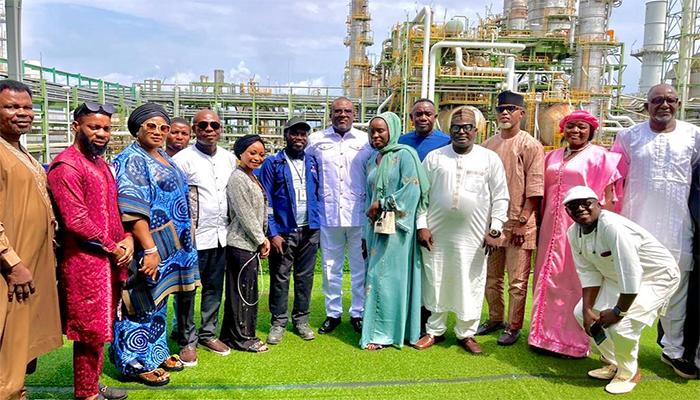By Moses Okorie
The umbrella body of all Bloggers and Vloggers, Content Creators Association in Nigeria (BAVCCA), has described Dangote Industries as national assets every Nigerian must protect, nurture, and defend against any form of sabotage or doubt because of the value it adds to national economy.
The group took their position in a speech delivered by president of BAVCCA, Ikechukwu Chukwunyere in Abuja on Wednesday as fallout of their visit to Dangote Refinery saying it was a pilgrimage to witness firsthand the embodiment of Nigerian ingenuity, resilience, and vision.
According to Chukwunyere, “We have just returned from an inspiring and eye-opening visit to the Dangote Refinery, where I had the honor of leading a 15-man delegation representing our vibrant community of bloggers, vloggers, and content creators. This visit was not merely a tour; it was a pilgrimage to witness firsthand the embodiment of Nigerian ingenuity, resilience, and vision.
“As we gather here, I want to share every detail of this remarkable experience, for it underscores a critical message: Dangote Industries is not just a private enterprise—it is a national asset that every Nigerian must protect, nurture, and defend against any form of sabotage or doubt.
“Let me begin by recounting the powerful testimony shared by the Vice President of Dangote Refinery, Mr. Edwin Devakumar. He spoke with unwavering conviction about how he believed in the dream of Alhaji Aliko Dangote, the President of Dangote Group for the refinery, even when initial investor skepticism loomed large.
“Despite the doubts from potential backers, Mr. Devakumar provided crucial support, backing Alhaji Dangote’s dream every step of the way. The refinery project, valued at over $20 billion, stands as a testament to this unyielding faith. Alhaji Dangote himself made extraordinary sacrifices, selling most of his assets to fund the project amid those investor doubts.

“This narrative is more than a story—it’s a testament to Alhaji Dangote’s determination and the Vice President’s faith in the project, proving that great visions are realized through personal commitment and steadfast belief”.
Chukwunyere hailed Alhaji Aliko Dangote and his management team for placing the welfare of Nigerians at the heart of every decision they make, saying resilience was another key theme, because despite setbacks, such as the closure of the Arewa Textile Industry in Kaduna, Alhaji Dangote persevered, keeping his vision alive against all odds.
He said the global impact of this perseverance is now evident, the Dangote Refinery in Ibeju-Lekki, Lagos, is the largest in the world, creating countless jobs and opportunities for Nigerians and beyond.
“Tangible achievements abound: almost 4,000 tankers on the ground, along with numerous other accomplishments that serve as a testament to Alhaji Dangote’s dedication. This is a powerful story of perseverance and vision, one that is making a lasting impact on our nation and the world.
“Complementing the refinery’s success is the Dangote Fertilizer Plant, which stands as a beacon of innovation in Nigeria’s agricultural sector. With an impressive production capacity of 3 million metric tonnes per annum of urea, it positions itself among the world’s largest facilities, enabling the supply of essential nutrients to farmers across Africa and beyond. Its equipment showcases superior technology, including a captive power plant equipped with three steam turbine generators each delivering 40 MW for a total of 120 MW, complemented by three auxiliary boilers that generate 200 tonnes of steam per hour at 40 ATA, ensuring uninterrupted and efficient operations even in challenging conditions.
“This state-of-the-art infrastructure not only enhances fertilizer quality but also supports sustainable farming practices by minimizing downtime and optimizing resource use.
“The Dangote Refinery itself represents the pinnacle of sophistication in petroleum processing, featuring advanced equipment such as the world’s largest single-train refinery design, which integrates cutting-edge distillation columns, catalytic crackers, and hydrotreaters to efficiently handle a diverse range of crude oils and produce high-quality fuels and petrochemicals at an initial capacity of 650,000 barrels per day”.